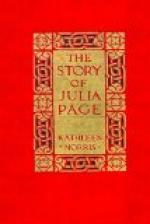The girl ran upstairs, and snatched her hat and a light coat. Two minutes later she was downstairs again, the chatelaine bag in which all girls carried their money in those days jumping at her belt.
But in those two minutes Chester had disappeared. Julia felt sick with disappointment as she reached the corner only to find him gone. She stood looking quickly about her: up the street, down the street; he was gone. It seemed to the girl that she could not go back to her grandmother’s house again; a disgust for everything and everybody in it shook her from head to foot. She was sorry for them, her grandmother, her cousins, but the simple fact remained that they could bear this sort of existence and she could not; it was stifling her; it was killing her.
“If they minded things as I do they would change them, somehow!” said Julia to herself, walking on blindly. “My grandmother should never have let things get to such a pass—I can’t bear it! The smells and the fights—”
She stopped a car, one of the cable cars that ran out into the factory district. Julia had no idea where she was going, nor did she care. She got on because one of the small forward outside seats was empty, and she could sit there comfortably. The car went on and on, through a less and less populated district, but Julia, buried in unhappy thought, paid no attention to route or neighbourhood.
“All off!” shouted the conductor presently. Julia had meant to keep her seat for the return trip, but the man’s glance at her young beauty annoyed her, and she got off the car.
She walked aimlessly along a battered cement sidewalk, between irregularly placed and shabby little houses. These were of too familiar a type to interest Julia, but she presently came to a full stop before a wide, one-story brick building, with a struggling garden separating it from the street, and straggling window boxes at every one of the wide windows. A flight of steps led up from the garden to the pretty white front door, and a neat brass plate, screwed to the cement at the turn of the steps, bore the words: “Alexander Toland Neighbourhood House.”
It would have been a pretty house anywhere, with its crisp dotted muslin curtains, its trim colonial walls, but in this particular neighbourhood it had an added charm of contrast, and Julia stood before it literally spellbound by admiration, and smitten, too, with that strange sick fascination to which the mere name of Toland subjected her.
And while she stood there, Miss Anna Toland came to the door and stood looking down at the street. Julia’s heart began to beat very fast, and the blood rushed to her face. She bowed, and Miss Toland bowed.
“Oh, Miss Page!” said Miss Toland then, crisply ready with the name and the request. “This is very fortunate! I wonder if you won’t come in and help me a moment? I’ve been trying for one hour to make the hall key work.”




